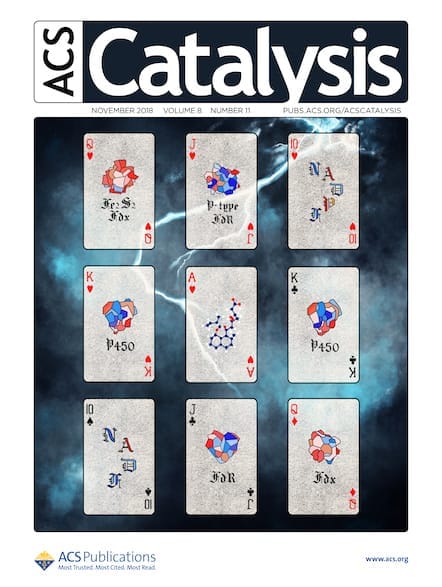ACS Catalysis and the ACS Division of Catalysis Science and Technology are pleased to recognize Professor Thomas R. Ward of the University of Basel in Switzerland for pioneering the development of artificial metalloenzymes (ArMs) for organic synthesis by merging organometallic catalysis with enzymatic catalysis. He had a vision of engineering and evolving ArMs as biocatalysts for […]

ACS Catalysis and the ACS Division of Catalysis Science and Technology are pleased to recognize Professor Thomas R. Ward of the University of Basel in Switzerland for pioneering the development of artificial metalloenzymes (ArMs) for organic synthesis by merging organometallic catalysis with enzymatic catalysis.

He had a vision of engineering and evolving ArMs as biocatalysts for organic synthesis based on the biotin-streptavidin technology that was introduced by George Whitesides and coworkers in 1978 (J. Am. Chem. Soc. 1978, 100, 306–307). In his landmark paper published in JACS in 2003, Ward used biotin to anchor a rhodium catalyst into the active site of streptavidin and demonstrated that the resulting ArM could catalyze asymmetric hydrogenation of alkenes with the enantioselectivity dictated by the chiral environment of the protein (J. Am. Chem. Soc. 2003, 125, 30, 9030–9031). In the following years, the Ward group extended this strategy to create ArMs for a wide variety of water-compatible transformations such as transfer hydrogenation, allylic substitution, dihydroxylation, and sulfoxidation (Acc. Chem. Res. 2011, 44, 1, 47–57). In addition, the Ward group created chimeric streptavidin scaffolds able to host biotinylated catalysts as ArMs for asymmetric transfer hydrogenation, ring-closing metathesis, and anion−π catalysis (ACS Catal. 2018, 8, 2, 1476–1484).
In the past seven years, Ward has focused on making ArMs function in living systems, which has the potential to greatly expand applications of ArMs for biocatalysis and synthetic biology. In another seminal paper published in Nature in 2016 (Nature 2016, 537, 661), he created an artificial metathesis ArM in the periplasm of E. coli and applied directed evolution to dramatically improve its activity. Recently, the Ward group has extended this concept to encompass ring-closing metathesis, enabling the conversion of bio-based feedstocks to a range of cycloalkenes (Nat. Commun. 2019, 10, 5060). In addition, Ward showed that ArMs could be used to control the function of a genetic switch in mammalian cells (Nat. Commun. 2018, 9, 1943) and uncage drugs and fluorescent probes in living cells in an orthogonal manner (J. Am. Chem. Soc. 2019, 141, 17048). Notably, he demonstrated that carbonic anhydrase can be used as a promising scaffold to create ArMs for whole-cell catalysis (ACS Catal. 2019, 9, 5, 4173–4178).
Ward carried out his Ph.D. in Chemistry at ETH Zürich under the guidance of Professor Luigi Venanzi in close collaboration with Professor Dieter Seebach before moving to Cornell University for a Swiss National Science postdoctoral fellowship in Professor Roald Hoffmann’s group followed by a second postdoc in the group of Professor Carlo Floriani at the University of Lausanne. He took up an independent position at the University of Bern in 1993 and moved to the University of Neuchâtel in 2000. Since 2008, Ward has worked at the University of Basel’s Department of Chemistry, where he is currently a full Professor. His work has been recognized with the Czech Academy of Sciences medal and RSC Bioinorganic Chemistry Award among others.
Ward’s work has inspired many researchers around the world, ranging from chemistry to biology to engineering, to create artificial metalloenzymes for organic synthesis both in vitro and in vivo. The cross-disciplinary approach of his research truly exemplifies the blurring of boundaries across fields of catalysis and the essence of the ACS Catalysis Lectureship. We are delighted to celebrate these achievements in the awarding of the 2021 ACS Catalysis Lectureship for the Advancement of Catalytic Science. The Division and journal are pleased to recognize Ward at a special symposium during the hybrid ACS National Meeting in Atlanta, August 22-26, 2021.
About the ACS Catalysis Lectureship for the Advancement of Catalytic Science
The ACS Catalysis Lectureship for the Advancement of Catalytic Science annually recognizes significant contributions by an individual or a team of researchers to the understanding and/or practice of catalysis. Since 2018, the Lectureship has been awarded on an annual cycle recognizing researchers in three traditional subdisciplines of catalysis:
- Biocatalysis and enzymology, 2021
- Heterogeneous catalysis, 2022
- Homogeneous or molecular catalysis, 2023
While this rotation ensures that significant achievements in all fields will have an opportunity to be recognized, it is noteworthy that the barriers between the subfields continue to be slowly discarded as the broad field of catalysis matures. Marking the 11th year of collaboration between the journal, ACS Catalysis, and ACS Division of Catalysis Science and Technology, 2022 will see the announcement of the 11th Lectureship award winner, with nominations due in November 2021. Inquiries may be sent directly to Award.ACSCatalysis@acs.org.
Past Lectureship Winners
- 2020 – Shannon S. Stahl, University of Wisconsin – Madison – article
- 2019 – Maria Flytzani-Stephanopoulos and E. Charles H. Sykes, Tufts University – article
- 2018 – Nicholas Turner, University of Manchester – article
- 2017 – Paul Chirik, Princeton University –article
2016 – Matthias Beller, University of Rostock, Germany – article - 2015 – R. Morris Bullock, Daniel DuBois, and the Pacific Northwest National Laboratory Hydrogen Catalysis Team – article
- 2014 – Suljo Linic, University of Michigan – article
- 2013 – John F. Hartwig, Berkeley – article
- 2012 – Alan S. Goldman, Rutgers University – article
